| Reviews & Columns |
|
Reviews DVD TV on DVD Blu-ray 4K UHD International DVDs In Theaters Reviews by Studio Video Games Features Collector Series DVDs Easter Egg Database Interviews DVD Talk Radio Feature Articles Columns Anime Talk DVD Savant Horror DVDs The M.O.D. Squad Art House HD Talk Silent DVD
|
DVD Talk Forum |
|
|
| Resources |
|
DVD Price Search Customer Service #'s RCE Info Links |
|
Columns
|
|
|
Two Weeks in Another Town (Warner Archive Collection)
"Kruger, you're great."
"I was great."
Entertaining soaper with serious intentions, hampered by miscasting and post-production tinkering. Warner Bros.' vital, necessary Archive Collection, which manufactures-on-demand (MOD) an increasing number of important library titles from the Warners' and M-G-M vaults, has released Two Weeks in Another Town, the unsuccessful 1962 melodrama based on the Irwin Shaw bestseller, directed by Vincente Minnelli and starring Kirk Douglas and Edward G. Robinson as end-of-their ropes ex-patriot filmmakers finding madness and redemption in la dolce vita Rome. Seen today within the context of Minnelli's period of big-budget, hyper-glossy, hyper-emotional melodramas, Two Weeks in Another Town has steadily gained in reputation, but back in '62, nobody was buying this follow-up (of sorts) of Minnelli's earlier Hollywood expose, The Bad and the Beautiful...and maybe-to a point-they were right.
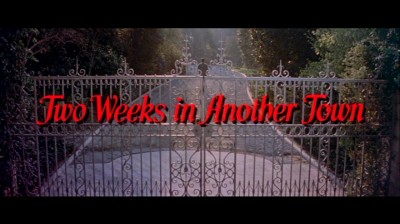
The Bridgewood Retreat, Fairview, Connecticut. At this exclusive sanitarium, former Oscar-winning actor Jack Andrus (Kirk Douglas) has been treated for "manic-depression, psychosis, compulsive violence, delusional episodes, and alcoholism, acute and chronic." Having suffered a complete mental breakdown after a horrific car accident three years before, brought on by witnessing his ex-wife, the sick, perverted, vampiric Carlotta (Cyd Charisse), making love to another man, Jack is now ready to leave the facility. Fortuitously, a telegram arrives from Rome, where Maurice Kruger (Edward G. Robinson), the director who guided Jack through their greatest films, wants to help Jack with a two-week assignment for a small but significant role in his latest project: a period romance being shot at the famed Cinecitta Studios. Desperate, Jack accepts, even though Kruger also betrayed him with Carlotta.
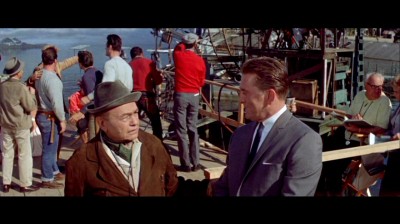
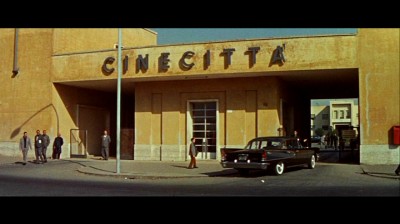
What Jack doesn't know is that Kruger is also in a perilous place in his career. His last films failures, this come-down to Italian movie-making represents the director's last chance, and one that he can't come back from if he blows this assignment. Told by his philistine producer, Tuchino (Mino Doro), that he has only two weeks to finish the film or he'll take over production, Kruger knows that's not enough time to finish shooting and supervise the dubbing--a technical process of looping-in actors' dialogue that's critical in Italian filmmaking. So Kruger devises a plan: he'll dump Jack as an actor (blaming his scarred face), and grab him as dubbing director, because he knows, despite their love/hate relationship, that Jack will give him a "Kruger picture." However, Kruger's plans are critically compromised by the difficulties he's having with Italian diva Barzelli (Rosanna Schiaffino), troubled young American actor Davie Drew (George Hamilton), and Jack's romance with understanding, loving Veronica (Daliah Lavi), who also happens to be Davie's girl-this last problem Kruger most certainly doesn't have, being married to shrewish whiner, Clara (Claire Trevor). The arrival of the deadly Carlotta, though, will tip the scales for everyone involved in the production.
MAJOR PLOT SPOILERS ALERT!
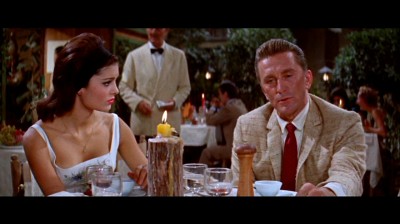
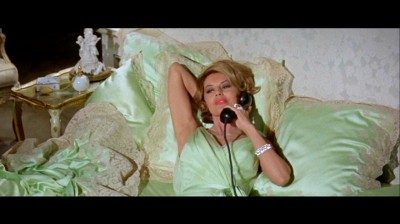
Back in "film school" (cripes), I had a professor that loved Minnelli's musicals, and who wouldn't hear a good word about his super-saturated big-screen dramas like Some Came Running and the The Cobweb (which is also now available through the Archive Collection). I never knew if it was a snobby kind of disdain for the sometimes lurid look and tone of the pieces, or simply because the professor equated Hollywood soap operas with pop culture garbage. Of course that attitude doesn't hold a lot of sway anymore, so Minnelli's big-screen dramas seem more accessible than ever...perhaps even more so than his musicals. For me, it's Minnelli's willingness to indulge in excess, both visually and emotionally, that I find most appealing in those efforts, a willingness that contrasts so beautifully with his gorgeously-designed, carefully-controlled widescreen frames. Two Weeks in Another Town isn't the best example of that contradiction (I go back and forth between The Cobweb and Home From the Hill), but it's entertaining in an obvious way, sporting another watchable "crazed" Kirk Douglas performance (more in line with Minnelli's earlier Lust for Life, rather than Two Weeks in Another Town's unofficial prequel, The Bad and the Beautiful), an unexpected turn from pro Robinson (alternately cruel and weak), and a bald-faced openness to say, "I'm going to try and make some 'art'," even if Minnelli succeeds only in bits and pieces. Unlike Douglas Sirk, who's far more subtle in masking the intent of his color and mise-en-scene information, Minnelli isn't afraid to literally tell the audience that his color palette has meaning. In recounting what happened on the night of the car accident, and in describing his sick relationship with Carlotta, Minnelli lets Douglas say out loud, "We always had a thing about [the color] green,"--an as-direct cue to the audience to watch out for a color, as I've ever seen in a major motion picture. That open quality, that willingness to wear his intentions on his sleeve, regardless of whether those intentions ultimately pan out aesthetically, is one of Minnelli's most endearing directorial qualities.
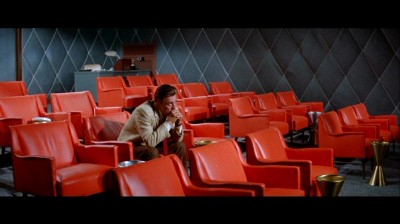
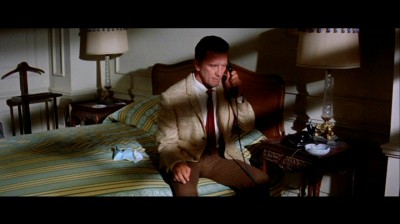
And certainly, Minnelli isn't shy about exaggerating and concentrating on his color palette to inform his framing. Red, obviously a "dangerous" color, pops up right from the beginning of the film (the red leather books dominate the head shrinker's office, separating Jack from the doctor), while later Jack wears a brilliant red sweater when directing--a warning sign that he's unaware of, considering Kruger will sabotage Jack's efforts in the end. Cyd Charisse's famed red hair is brilliantly set off by Minnelli's color for her (green), so why not pass off Jack to two more red-heads during the notorious "almost-orgy" scene? Kruger's almost-death scene, though, is pure Minnelli excess, where Kruger lies in state in an all-red room more appropriate to the death of a pope rather than a film director. Green, too, is critical to Minnelli's messages, cuing us to Carlotta's poisonous presence in Jack's bedroom when she calls and deflates his joy over meeting Veronica (the green stripes on his bed sheets, as he sits trapped in black prison bar-like shadows), as well as the green scarf that drops down from upstairs, during the orgy, a scarf linked to Jack's first accident/suicide attempt years before (he saw Carlotta drive by him, wearing one), and one that will now initiate his last rage with her. Again, Minnelli isn't subtle about these visual cues; on the contrary, their obviousness is part of his intent.
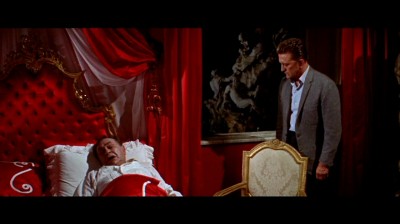
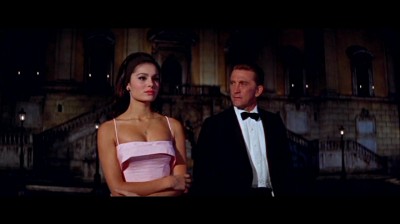
Just as obvious is Minnelli's and scripter Charles Schnee's intention to have the filmmaking process be a metaphor for the facades people construct to "hide away from the world." Obviously, actors do this, as Jack tells Veronica, but the very emphasis on "dubbing" in the story, creating a new performance by laying one actor's voice over a different performer, mirrors that transformational, duplicitous theme. Almost everyone in Two Weeks in Another Town is desperate to project an image that will hide their fears and terrors. Jack lies to himself about his ability to resist Carlotta's poison; Kruger lies to himself about his importance in the filmmaking world (again, Minnelli doesn't hide this; he has James Gregory, in a small role as a journalist, tell Kruger this to his face), and Davie lies about everything, hiding from the world in a spiraling bout of depression and violent paranoia. Clara assumes the role of supportive wife at dinner celebrations and at the sick bed of her husband...the husband who cheats on her relentlessly with his leading ladies. Only truthful Veronica states flatly she's not interested in films (and thus not interested in fiction, in lying), preferring to live without illusions (that's why she honestly can't give an answer to Jack about whether or not she's in love with him, with Davie, or both men). That's why she's like a tonic to Jack when she calls him on the phone, after the poison of Carlotta's influence, with Jack visibly reviving himself, like a rose in water, with her healing love. And redemption, both career-wise and spiritually, comes for Jack when he begins to collaborate with his crew during filming, when he listens to them and puts aside the false image of the cliched, dictatorial American director--the same pose that has ruined Kruger's career.
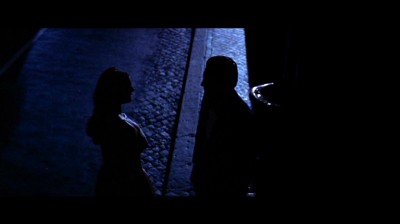
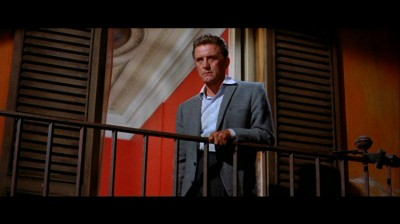
Unfortunately, a certain familiarity (even in 1962) with the material, apparent post-production tampering with Minnelli's finished film, and some painful miscasting, dampen Two Weeks in Another Town's overall impact. Certainly, the perception that Europe, specifically Italy and France (and even England, for that matter: the Carry On films) were hotbeds of decadence and licence, was already a well-worn stereotype in American pop culture by 1962, so Minnelli's relatively tame perversions here weren't received with as much shock as M-G-M would have probably liked. Fellini's more explicit La Dolce Vita's success in 1960 fired the imaginations of movie-going audiences for Rome all over the world, while the on-going international scandal involving the Rome production of Cleopatra proved to be more involving than anything going on in Two Weeks in Another Town (it also didn't help that Minnelli unwisely incorporated footage from the far better-received The Bad and the Beautiful into the film--a red flag waving in the face of 1962 critics who didn't care about any French auteur theory). Not helping, either, was the well-documented tampering M-G-M carried out on Minnelli's finished film, severely cutting the final orgy scene to almost an afterthought, thus robbing the film's cathartic final sequence of any impact (Jack trying to see if he'll kill Carlotta and himself in his Maserati), while also effectively eliminating what popular appeal the film may have had with American audiences looking for a little la dolce vita, U.S.A.-style.
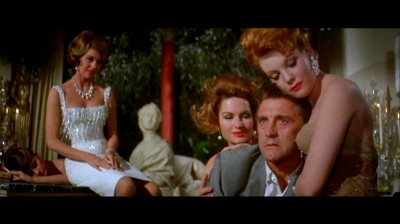
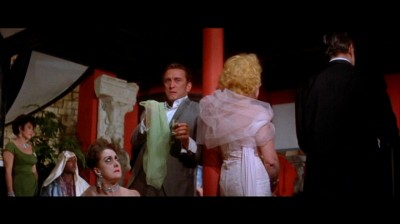
Equally problematic are some key miscastings, chief among them George Hamilton as the fiery, troubled Davie. Now, I'm a fan of George Hamilton when he plays light and funny. Minnelli had used Hamilton before in the brilliant Home From the Hill, but the slight, too-slick performer paled next to the robust George Peppard in that compelling drama. Here, he's completely in over his head as supposedly American's best and most troubled young actor, and that swing and a whiff leaves a serious hole in the film's romantic triangle. Hamilton simply can't convey the tortured despair and yearning that supposedly consumes Davie, nor can he effectively offer a romantic, sexual object for Lavi (or the audience), so his character becomes a painful, cardboard prop that Minnelli (perhaps knowing right from the start?) moves about with little interest. Not much better is Cyd Charisse as the notorious sexual predator, Carlotta. There's no doubt that Charisse has the chasse to physically inhabit the character; she's a gorgeous, opulent, lush creature here, as Minnelli shoots her. And Charisse had been good in other dramatic roles, when matched up with a well-written character (she's effective in Nicholas Ray's Party Girl). However, so much build-up is given to the Carlotta character before she ever comes on screen, it's hard to imagine who could have handled that embodiment of moral putrification. It doesn't help, either, that the Carlotta character isn't really a character; she's given almost no dialogue, no motivation, no depth: she's merely the embodiment of a concept, and that's going to leave even the most talented actress with very little to play...and Charisse wasn't at that level. And since Two Weeks in Another Town centers entirely on Jack's sexual and emotional obsession/revulsion with Carlotta, without an effective Carlotta, it's difficult to feel Minnelli has integrated his dramatic, production design, and performance elements into a successful, aesthetic whole.
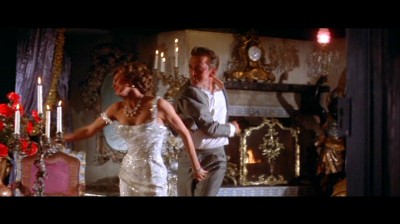
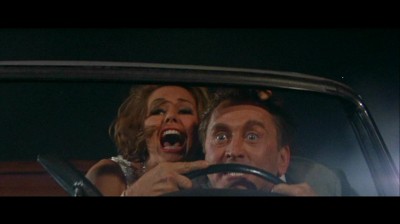
The DVD:
The Video:
Quite frankly, when I saw the "Remastered Edition" banner on the front of the DVD case, I was expecting a marked difference in the film's look, compared to the last time I saw it on TCM. Nope. It looked exactly the same (and that's not even close to what Technicolor® really looked like projected). If the anamorphically enhanced, 2.35:1 widescreen transfer has been remastered, I'd like to know how. The opening is decidedly pink and faded, with quite a bit of scratches and white drop-outs. The picture stabilizes later, but it still tends towards red. Otherwise, it's a sharp image, with no compression values.
The Audio:
The Dolby Digital English mono audio track is entirely serviceable, with expected but minimal hiss, and a decent, steady re-recording level. No subtitles or close-captions.
The Extras:
Very nice...for the Archive Collection: the original trailer is included.
Final Thoughts:
Two Weeks in Another Town is a solidly entertaining look at ex-pat filmmakers falling apart in decadent Rome, with Kirk Douglas' and Edward G. Robinson's strong performances anchoring director Vincente Minnelli's beautifully-stylized widescreen palette. That said...critical miscasting and post-production tampering negated any potential lasting impact Two Weeks in Another Town might have had, leaving us with a good soaper...but not much else. I'm recommending Two Weeks in Another Town.
Paul Mavis is an internationally published film and television historian, a member of the Online Film Critics Society, and the author of The Espionage Filmography.


|
| Popular Reviews |
| Sponsored Links |
|
|
| Sponsored Links |
|
|
| Release List | Reviews | Shop | Newsletter | Forum | DVD Giveaways | Blu-Ray | Advertise |
|
Copyright 2024 DVDTalk.com All Rights Reserved. Legal Info, Privacy Policy, Terms of Use,
Manage Preferences,
Your Privacy Choices | |||||||












